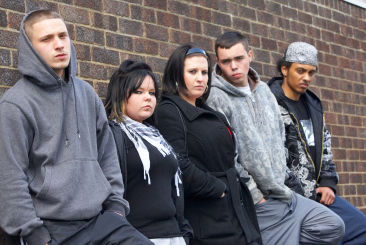|
|
| Bonds of Compassion – Homeboy Industries |
| By National Gang Center Newsletter |
| Published: 08/11/2014 |
 “Lisa” started kicking it with the “homies” in her Los Angeles neighborhood when she was 13. By the time she was in high school, she was heavily into drugs and “hitting up and shooting up” with the gang. With her younger sister as her “crime partner,” Lisa “finally got that attention I was looking for,” she said.
“Lisa” started kicking it with the “homies” in her Los Angeles neighborhood when she was 13. By the time she was in high school, she was heavily into drugs and “hitting up and shooting up” with the gang. With her younger sister as her “crime partner,” Lisa “finally got that attention I was looking for,” she said.
It wasn’t long before Lisa caught the eye of an older gang member. At 28, he was considered a shot-caller who commanded the respect of the younger gang members. Lisa assumed he made his money selling drugs, but she didn’t ask, and he didn’t talk about it. When Lisa got pregnant at 17, the couple married and moved to Chicago. As it turned out, Lisa’s suspicions regarding her husband’s income only hinted at a much more complicated reality: the “Windy City” was home base for an international drug cartel, and her new husband worked as a runner between Chicago and Mexico. In her unexpected role as a mother of one and then two children, and wife to a drug lord, Lisa felt trapped. “I had all the glamour,” she said, “but no friends or family. I practically had a double life. My husband had a different name, I couldn’t talk to anybody, and he was never there.” When her husband was killed in a drug feud, Lisa moved back to Los Angeles and shortly thereafter was incarcerated on charges of accessory to murder (in an unrelated case). She was a young widow separated from her children, with a long list of addictions and no hope for recovery. After prison, Homeboy Industries was Lisa’s off-ramp, as it is for other previously incarcerated and formerly gang-involved men and women who seek the agency’s services. For more than 25 years and for thousands of clients, Homeboy has served as a beacon of hope in Los Angeles, illuminating an alternative route for those traumatized by the intergenerational cycle of gang violence. Lisa entered Homeboy’s paid 18-month job training program, where she began working in maintenance, and was quickly promoted to an administrative position. During their time at Homeboy, clients are assigned case managers who help them chart an individualized course through therapy and additional services tailored to their needs. Various classes include the following: computer basics, bride to college, building healthy relationships, parenting, domestic violence, and anger management. Clients participate in 12-step groups, have visible tattoos removed, obtain their GEDs, and work with mental health professionals to deal with the traumas they have experienced. Employment counselors assist clients with the creation of résumé’s and guide them in setting career-oriented goals. Lisa’s words evoked what so many participants at Homeboy experience: “Because of the program, I’m finally getting the taste of a free world,” she said. In less than a year at Homeboy, Lisa has obtained her driver’s license—an achievement a judge once deemed “impossible”—and is working to be granted visitation of her children. She has moved into a safer neighborhood and is saving money to pursue her longtime dream of becoming a make-up artist. The Homeboy model of therapeutic community served as a catalyst in changing both Lisa’s thoughts and her behaviors regarding her future. “Before, I hated life,” she explained. “I felt like I was always a disappointment to everyone. Here, people look up to me as I transform my life.” A UCLA longitudinal, mixed-methods study of Homeboy Industries, currently being conducted by Dr. Todd Franke and Dr. Jorja Leap, has begun to document the shift in identity towards prosocial behaviors and the decrease in antisocial activities. In a subsample of 50 individuals followed over four years, 38 have expressed their belief that identity or the sense of self is a core issue, and that their involvement in the Homeboy program has allowed them to change. According to Dr. Leap, “Every sample member openly admitted to having belonged to a gang or neighborhood but the majority invariably added, ‘I have moved on,’ or ‘That’s not part of me anymore.’” What the research has begun to demonstrate through both quantitative and qualitative measures is that effective reentry is achieved by replacing the conditional acceptance of gang membership with the unconditional love of a therapeutic community. Lisa’s experience exemplifies this shift. As she explained, “What makes us a family is that we try to help each other. We feel each other’s pain.” For more information on Homeboy Industries, please visit www.homeboyindustries.org. Reprinted - National Gang Center - Spring/Summer 2014 Newsletter |
MARKETPLACE search vendors | advanced search

IN CASE YOU MISSED IT
|


Comments:
No comments have been posted for this article.
Login to let us know what you think